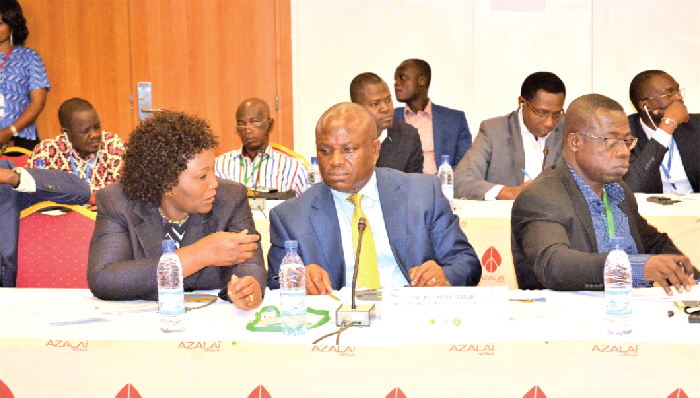
GPHA to harmonise billing this month
The Ghana Ports and Harbours Authority (GPHA) is to harmonise billing procedures at the port by deploying an electronic interface as part of measures to eliminate delays in processing payments at its revenue mobilisation centre.
The electronic billing (e-billing) system, which will serve as an interface with the banks’ officials, says it would reduce physical interactions where importers and agents had to send invoices in hard copies to the banks.
Implementing the e-billing system will reduce the cost associated with the processing of invoices by importers.
According to the acting General Manager of Marketing and Corporate Affairs at GPHA, Mrs Esther Gyebi Donkor, should the authority be able to deploy an electronic payment platform before September 1, 2017, bills for port charges could be sent electronically from the revenue centre to the banks so that the agents and importers would not have go to the revenue centre for any form of manual processing.
Presently, billings on port fees and charges are such that agents and importers have to go to several desks at the centre, but Mrs Donkor indicated that a number of desks that customers would have to go through for the billing to be done would have to be merged and officers deployed for other activities.
She told the Daily Graphic on the sidelines of the just ended seminar on Single Windows and Port Community Systems (PCSs) in Cotonou, Benin, that the harmonisations ought to be done quickly in line with system improvements being done on terminal operating systems if an overall efficiency in port processes was to be achieved.
“In strengthening customer relationships and trading partnerships, electronic interfaces are needed to help eliminate delays between the receipt of invoice on imports,” she said.
The programme was organised by the Ports Management Association of West and Central Africa (PMAWCA) to provide a deeper understanding on the subject, share and learn from the experiences of countries that have already deployed these tools, and appraise the successes achieved so far.
Over 100 participants, including officials from the GPHA, the Ghana Shippers Authority (GSA) and West Blue Consulting attended the three-day programme.
PCS
While countries within the West and Central African region were being encouraged to implement Port Community Systems in line with the Single Window requirements, Mrs Donkor said the GPHA having been sensitised at the seminar to the PCS concept would want to improve upon its Jademaster Terminal operating system being in use at the terminals within the port.
“One major issue is that the paperless situation could take a while before it is phased out, so we will continue to improve upon the systems even after the September 1 deadline for the policy reforms, so they will go a long way in consolidating gains,” she stated.
Interactions, she suggested, had shown that compliance level among stakeholders, shippers adapting to change and the inputting of right message into the system continued to delay processes in spite of efforts being made by the GPHA to ensure seamless processes within the port space.
Mrs Donkor stressed that waybill processing points at the Golden Jubilee Terminal (GJT) where cargo deliveries were done would also be collapsed into one-stop shop point where clients may not be required to visit with a physical waybill.
“We are in talks with the Ghana Community Network Services (GCNet) to provide some linkage for the interface, while West Blue provides the platform for the e-billing under the single interface project,” she indicated.
The interface, she maintained, could help with the implementation of the Vice-President’s directive on the joint inspection, as it would allow all institutions that would be required in the process to leave their remarks in the system so other stakeholders would also be aware of such inspection activities.
E-Commerce
Mrs Donkor emphasised that with e-commerce revolutionising the global trade chain, the offer of door-to-door shipping services where imports could be cleared and sent to the doorstep of shippers had become the order of the day.
Ports, she noted, had become an important link in enabling door-to-door shipping services, such that competitiveness was being defined by factors such as e-commerce, availability of docks, handling facilities among others.
The GPHA, she suggested, would like to implement the concept since it could present an opportunity for trade and development as well as increasing Ghana’s competitiveness within the global trade chain